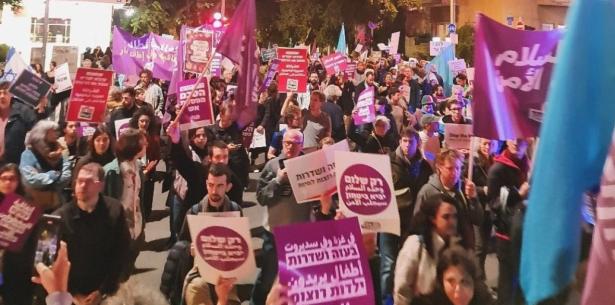ON THURSDAY January 18 more than 2,000 people marched through the streets of Tel-Aviv, calling for a ceasefire agreement that will end hostilities in Gaza, in the biggest peace demonstration inside Israel since the war began.
The march and rally were endorsed by more than 30 organisations, and organised jointly by Standing Together and Women Wage Peace.
“We are all in pain over the harsh reality we are living. The pain of the bereaved families, of those kidnapped, of the people we were uprooted and forced to leave their homes. We are all horrified when we hear about civilian casualties, including children, in the Gaza Strip and in the Gaza Envelope,” read the statement calling for the march.
“For many, it is now clear: only a ceasefire agreement can return the hostages alive to their families and stop the killing of innocent people.
“But in the extremist government of Netanyahu, Ben Gvir and Smotrich, they are pushing towards the other direction: they talk about population transfer and ‘voluntary migration,’ they reject the possibility of diplomatic negotiations with the PLO and the Palestinian Authority, and they promise us nothing — except many more years of war and suffering. For us, the people who live in Israel, there are two options: either Israeli-Palestinian peace or an eternal war.”
The protesters — both Jewish and Palestinian citizens of Israel — convened in the centre of Tel-Aviv, near Dizengoff centre, and marched through the streets chanting in Hebrew and Arabic: “Jews and Arabs refuse to be enemies,” “Peace, equality, social justice,” “In Gaza and Sderot, children want to live,” “Our answer to the right wing: Israel and Palestine.” They were holding bilingual signs that read “Only peace will bring security” and “The majority demands a ceasefire agreement.”
Originally planned to take place the week before, the police ordered the protest to be cancelled, citing “concerns over possible incitement” as the official reason.
The organisers from Standing Together and Women Wage Peace were supported by the legal department of the Association for Civil Rights in Israel, threatening the police with legal action at the supreme court. Eventually, because of public pressure, the police allowed the demonstration to take place, although changing the route of the march.
Standing Together leaders note encouragingly that those parts of the peace movement that until now were hesitant to come out in the open calling for a ceasefire agreement or to question the objectives of the war, have now officially joined the protests in the streets, reflecting a broader shift in the public opinion inside Israel.
The march ended in Cinematheque Square, where several Jewish and Palestinian speakers addressed the crowd.
“I survived the horrors, but far too many of my friends did not,” said Neta Peleg, from Kibbutz Beeri, which was taken over by Hamas militants on October 7, and in which more than 90 civilians were murdered.
“I am incredibly angry at our government for betraying us, for sacrificing us. Every day that passes, more people are killed. We must reach a deal that will bring back the hostages — now! We must stop this war and send this government back home.”
Neta Heiman, an activist with Women Wage Peace, is the daughter of Ditza Heiman, who was taken captive by Hamas on October 7, and released in November: “The Kibbutz where I was born, Nir Oz, suffered a massacre. Over a quarter of its residents were murdered or kidnapped, the homes were looted, and the army only arrived after the last terrorists had already left.
“I was incredibly angry over the Hamas monsters who kidnapped my elderly mother, but also incredibly angry at those at the helm in the state of Israel, who in the past 20 years failed to see that you cannot ‘manage the conflict’, you have to end it. Had we taken a different path, that of peace, October 7 was avoidable.”
Rula Daood, national co-director of Standing Together, said: “As a Palestinian citizen of Israel, I hear all the eulogies, in Hebrew and in Arabic, coming from both Israeli society and from the Gaza Strip.
“We must change course. The future of both our peoples depends on achieving an Israeli-Palestinian peace, which is the only way to bring us all security and safety. This path is long, but we know: where there is struggle, there is hope.”
Uri Weltmann is the national field organiser of Standing Together, a grassroots political movement of Jewish and Palestinian citizens of Israel that campaigns for peace, equality and social justice.


Spread the word